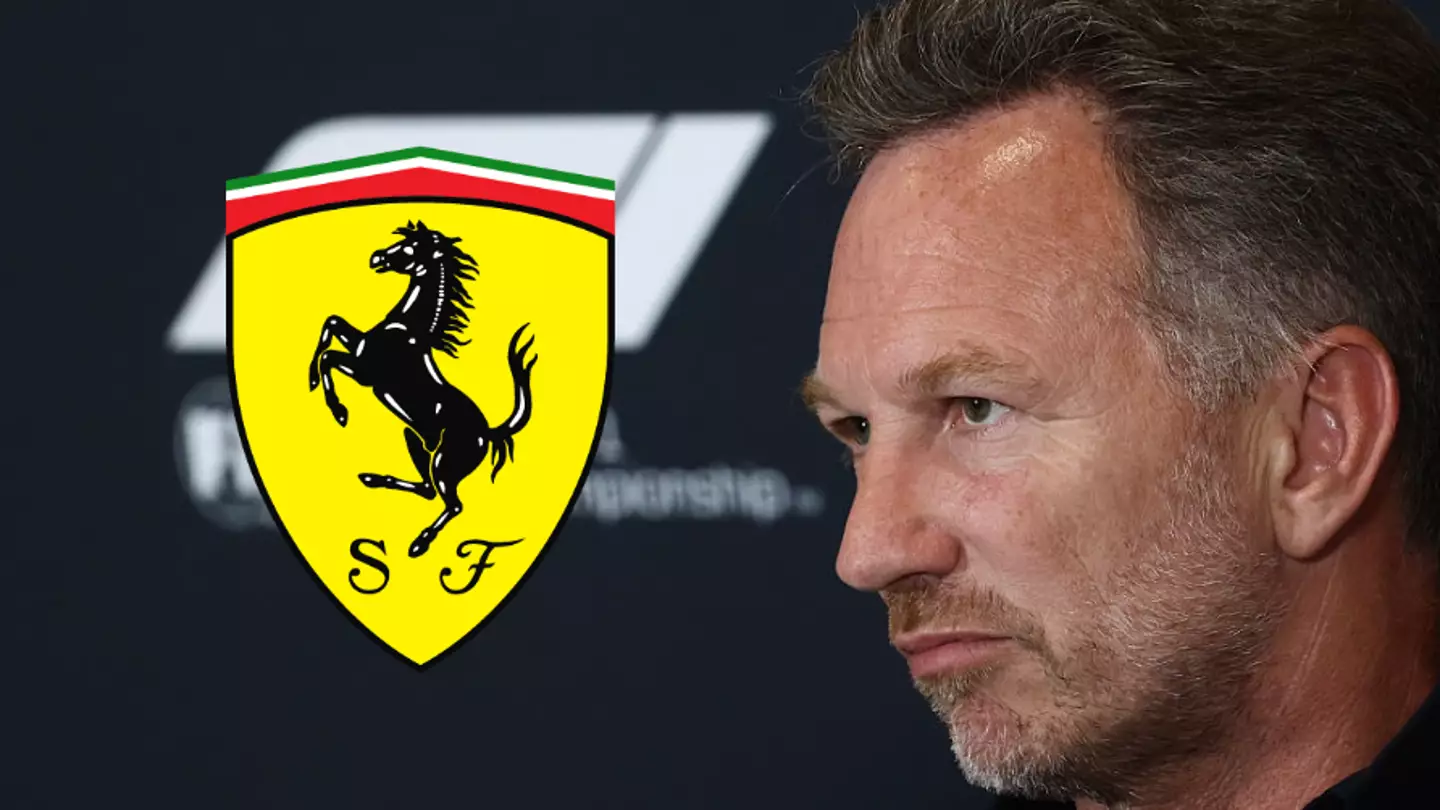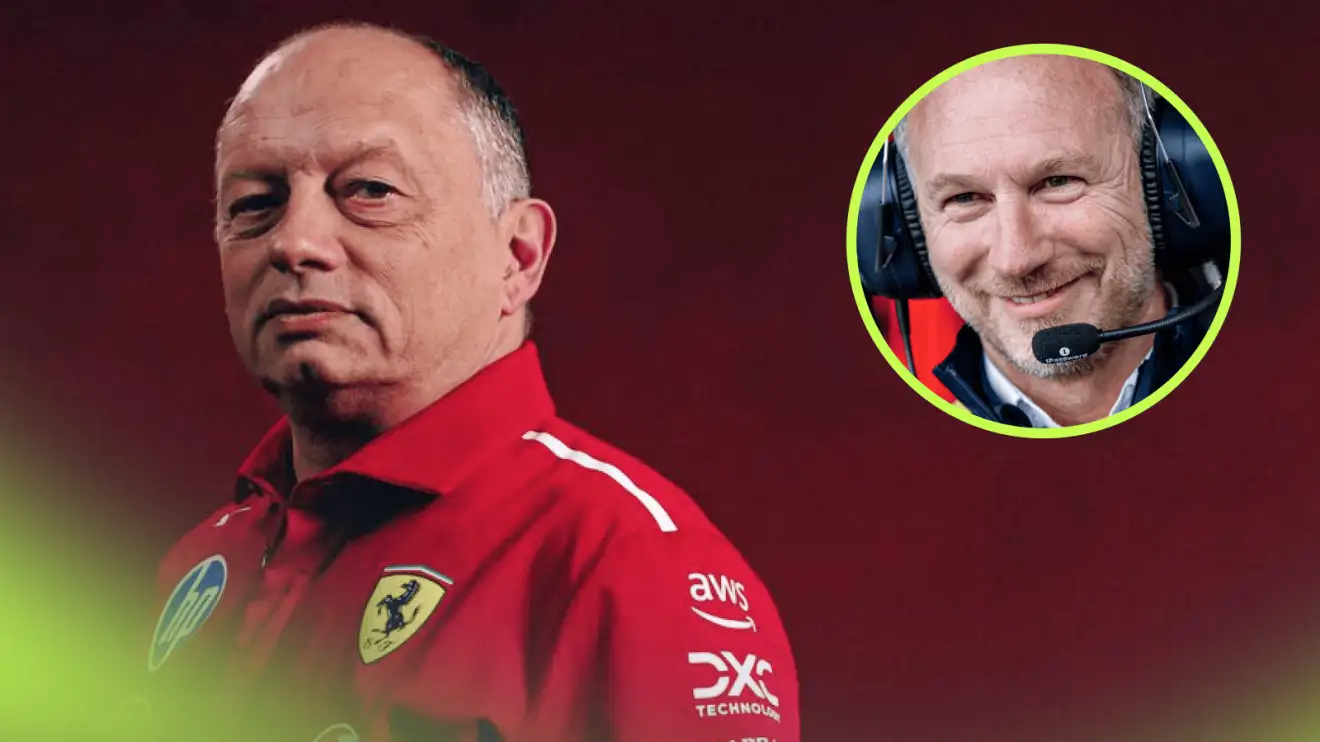In the cutthroat, high-stakes theater of Formula 1, silence is often louder than an engine. But when the whispers become a roar, sometimes the only response is a public declaration of war—or in Ferrari’s case, a public declaration of peace.
The F1 paddock, often called the “Piranha Club,” has been electric with a rumor so potent it threatens to reshape the grid: Christian Horner, the exiled architect of the Red Bull dynasty, was being linked to the most hallowed seat in motorsport. Not as a driver, but as the new boss of Scuderia Ferrari.
The speculation reached a fever pitch. Ferrari, the sport’s most iconic team, is in the midst of a “troublesome period,” a polite euphemism for a season devoid of a single Grand Prix victory. Their current team principal, Frederic Vasseur, is weathering the storm, but the pressure in Maranello is suffocating.
And then, the bombshell. Just before the critical United States Grand Prix, Ferrari Chairman John Elkann did the unthinkable. He didn’t just deny the rumors; he stepped into the public square and issued a powerful, unequivocal statement of support for his current chief.

“I want to express our full confidence in our team principal, Fred Vasseur,” Elkann declared, his words aimed as much at his own anxious team as they were at the global media. “And in the work he is carrying out together with all his colleagues at Scuderia Ferrari – the mechanics, engineers, and drivers.”
Elkann wasn’t finished. He stressed the “importance of teamwork from everyone to maintain focus on the only goal that truly matters: always giving our absolute best on track.”
In the world of F1, a public vote of confidence is a notoriously double-edged sword. It is both a shield for the person being defended and a glaring admission that they were, in fact, under attack. Elkann’s move was a calculated power play, a “hands-off” warning to pretenders to the throne and a desperate plea for stability within a team that is visibly buckling under the weight of expectation.
To understand why Elkann felt compelled to make such a move, one must understand the man at the center of the storm: Christian Horner.
For two decades, Horner was Red Bull Racing. He took a fledgling team backed by an energy drink and forged it into a 14-championship-winning colossus. He was not just the team principal; he was the chief executive, a political heavyweight who wielded “near-absolute power” under the protective wing of Red Bull’s founder, Dietrich Mateschitz.
Then, Mateschitz passed away in 2022. The power dynamic shifted. The parent company in Austria, Red Bull GmbH, now run by a new guard including Dietrich’s son, Mark, became increasingly uncomfortable with the level of control Horner possessed. Tensions that had been simmering for years finally boiled over.
In July, the unthinkable happened. Horner was axed.

His departure was not a quiet retirement. It was a political ousting, finalized last month with a staggering payout believed to be worth around £80 million. That kind of money isn’t a “thank you”; it’s a “go away and stay quiet” severance.
But Christian Horner does not stay quiet. At 51, he is the most successful, most sought-after, and most dangerous free agent in modern F1 history. He is available for the 2026 season, a year that coincides with a massive regulation change that will reset the entire sport. And he is, by all accounts, “eyeing a return” and has already begun “reaching out to several team owners.”
This is what forced John Elkann’s hand. The shark was in the water.
The link to Ferrari is as obvious as it is complicated. The Scuderia is desperate for a championship. They have the money, the heritage, and the drivers, but they lack the ruthless, winning culture that Horner built at Red Bull. He is the ultimate “finisher,” the missing piece of the puzzle.
But there’s a catch—a very expensive, very complicated catch.
Horner isn’t looking for just a job; he’s looking for control. Reports indicate that any potential new role would be contingent on him securing a financial stake in the team. After his experience at Red Bull, he doesn’t just want to be the CEO; he wants to be an owner. He wants equity. He wants power that cannot be taken away by a boardroom.
And that is where the Ferrari dream likely shatters.
Ferrari is not a simple racing team. It is a public company, a national icon, and a deeply political entity. Horner, who just fled a power struggle at Red Bull, would be walking into a political labyrinth far more complex than anything he ever faced. He would not be given the “near-absolute power” he craves. He would have to answer to Elkann, to the board, and to the immense pressure of the Italian press and the Tifosi, the team’s fanatical supporters.
Elkann’s public support for Vasseur is, therefore, a message to Horner as well: You will not find the control you seek here.
It’s also a necessary defense for Vasseur, who is in an impossible position. The Frenchman signed a multi-year extension earlier in 2024, a sign that the team believed in his long-term plan to rebuild. But Ferrari does not tolerate failure, and a winless season is the ultimate failure.
Vasseur is trying to fix the foundation while Horner is being advertised as a man who can build a palace on sand overnight. Every rumor, every whisper of Horner’s name, undermines Vasseur’s authority with the very mechanics and engineers Elkann was trying to rally.

The timing, just before the Austin race, was crucial. Elkann was trying to put a lid on the pressure cooker, to allow his team to focus on the track, not on who their boss might be next year.
But the story is far from over. Elkann’s statement has bought Vasseur time, but it has not solved Ferrari’s fundamental problem: they are not winning. And it has not solved the grid’s problem: Christian Horner is still on the market.
Horner is weighing his options, and he knows his value. With the 2026 regulations approaching, every team is reassessing. A proven leader like Horner could be the difference between a championship era and a decade of mediocrity. If not Ferrari, then where? The list of teams that could afford him, let alone offer him the equity he desires, is very, very short.
Elkann has drawn his line in the sand. He has chosen his man, Vasseur, and backed him against the biggest name in the paddock. It was a bold, necessary move to stop the bleeding.
But in Formula 1, loyalty lasts only as long as the last race result. If Ferrari’s “troublesome period” continues, if the wins don’t come, Elkann’s words will be forgotten. The whispers will return. And Christian Horner, the £80 million man, will still be waiting. The denial has been issued, but the political war for the future of Formula 1 has only just begun.